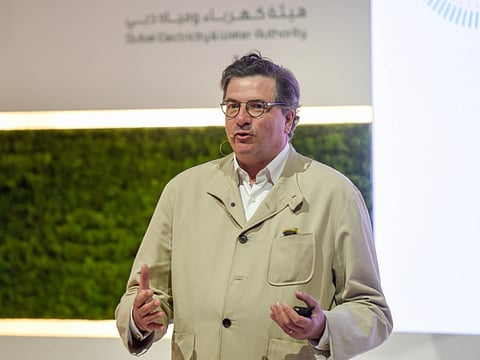‘Social media cannot substitute quality journalism’
Google to train 4,000 journalists in the Middle East by end of 2019

Dubai: Social media cannot substitute quality journalism and all the information shared through digital platforms should not be confused for news, a leading global media strategist said during the morning session of Arab Media Forum (AMF) on Tuesday.
Addressing media professionals at a session titled ‘Building a Stronger Future for News’, Carlo Biondo, Google’s president, EMEA Strategic Partnership, said there is a common impression that journalism cannot express its values anymore in the modern world because of the noise created by social media.
“People are confusing the information shared on social media for journalism, these are two different things and this should be clarified. This is one of the reasons why we launched the Global News Initiative.
"What we want is to define the criteria for quality journalism together with journalists. Social media has certain qualities but it cannot substitute journalism.
“What I am saying is that professional journalists promise certain things, like checking facts, objectivity, credibility, even if a journalist has a certain political orientation he will come clear with it, which is not the case with social media,” said Biondo.
He added that with the prominence of social media, tackling fake news or ensuring quality of information is "becoming increasingly difficult" — and this is where the role of media or publishers is so crucial.
“We have been facing this issue of fake news over the last few years, that’s why at Google we recently started a project called Fact Check.
"Basically, when a publisher decides to accept the principle of checking the facts and says I have checked the facts, we will put a label on that news item Fact Checked. This way people will know that the information is verified. This is having an impact,” added Biondo.
Global News Initiative
He said that as part of Google’s effort to better understand journalists and their role in the exchange of information, the global internet giant launched the Global News Initiative last week in New York.
“The initiative is based on three principles: one is listening to the press and trying to understand better how press works; the second is training — we will be training 4,000 journalists in the Middle East by the end of 2019 — and the third element is helping journalists better understand future technologies and more effective ways of data sharing,” he said.
According to Biondo, work on the training programme will begin next week and will also focus on the economic aspects of journalism, like how the business model works.
Privacy of data
The popularity of social media has also meant greater interaction between readers and news portals, bringing in focus the question of data privacy.
“It is clear that privacy is important and we need to protect the privacy of data shared by the readers on the web. We have to make sure that the data is not shared in a way that is not fair. But we will also have to make sure that we are not creating an environment where we cannot work together,” he warned.
Emphasising the importance of data, Biondo said that data is the new oil.
“Data is the currency of the future, so we need to be very careful about the environment we create and how we share the data,” he said.
Creating content
According to Biondo, the young people of the Middle East are very active on social media, which is obvious by the number of the region’s YouTube users.
However, he urged the Arab youth to rise from being just users to being creators.
“The Middle East has the best rate of YouTube users and we are happy for that. But we would like to have more creators from this region and that is one of the reasons we developed YouTube Space.
"The Middle East has been great at using the content, we now feel that the region should express itself even more. So creating the YouTube Space is a way for us to invite creators to work and develop content together,” he said.



